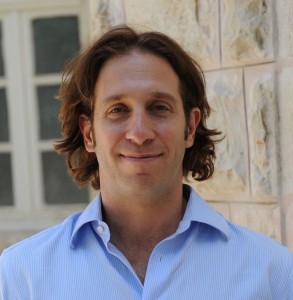CSUN ‘Education on the Edge’ Lecture to Explore Virtual Reality & Teaching

Jeremy Bailenson
The role virtual reality can play in the classroom will be explored in the first Education on the Edge lecture of the year on Tuesday, Dec. 2, at California State University, Northridge.
Jeremy Bailenson, associate professor of communication at Stanford University, founding director of Stanford’s Human Interaction Lab and director of Stanford’s Digital Learning Forum, will discuss his cutting-edge research on virtual reality and how it’s applied in the classroom. He also will explain the role that he envisions virtual reality will play in the classroom of the future.
“CSUN’s Center for Teaching and Learning was given the opportunity last year to host a speaker series that would prompt the community to really think about significant issues that impact education,” said Wendy Murawski, executive director and Eisner Endowed Chair for the Center for Teaching and Learning (CTL). “Dr. Bailenseon is the perfect speaker to start this year’s series. His focus on virtual realities relates to the STEM (science, technology, engineering and mathematics) disciplines, which are so hot right now. He will provoke people, particularly parents and educators, to really think about how their professional and personal lives might change based on this new reality.
“Technology isn’t new, but the way Bailenson and his colleagues are using it is truly cutting edge,” she continued. “This is the kind of topic and speaker that the CTL is excited to bring to the CSUN campus.”
Bailenson’s lecture is expected to take place from 7 to 8:30 p.m. in the Northridge Center of the University Student Union, located on the west side of the CSUN campus off Zelzah Avenue.
Bailenson’s main area of interest is the phenomenon of digital human representation, especially in the context of immersive virtual reality. His research explores the manner in which people are able to represent themselves when the physical constraints of body are removed. He also designed and studies virtual-reality systems that allow physically remote individuals to meet in virtual space. His research includes the examination of the manner in which these systems change the nature of verbal and nonverbal interaction. In particular, he studies how virtual reality can change the way people think about education, environmental behavior, empathy and health.
Bailenson regularly consults on policy issues surrounding virtual reality for government agencies, including the U.S. Army and Air Force, the Department of Defense, the Department of Energy, the National Research Council and the National Institutes of Health. Bailenson’s book, “Infinite Reality,” co-authored with Jim Blascovich, was recently quoted by the U.S. Supreme Court, outlining the effects of immersive media.
The Education on the Edge speaker series is free and open to the public. However, reservations are required. To reserve a seat, register at http://www.CTLbailenson.eventbrite.com.
Prior to the presentation, the CTL will host a demonstration of TeachLivE, a virtual classroom system that gives teachers the opportunity to practice pedagogical skills and content without impacting real students. CSUN associate professor of special education Sally Spencer will demonstrate the system beginning at 6:30 p.m.
CSUN’s Center for Teaching and Learning is the research, collaboration and professional development arm of the Michael D. Eisner College of Education. Faculty from departments across the college are conducting cutting-edge research and professional development to address the needs of schools, in collaboration with K-12 teachers and administrators and community members.
The center was established in the summer of 2002, thanks to a generous gift from the Eisner Foundation, the family foundation of Michael and Jane Eisner. The center initially focused on neurodevelopment and how knowledge of those constructs can be taught to teachers — and ultimately impact the way they teach and the way students learn. During the past few years, the center has broadened its scope. Faculty and affiliates are researching and analyzing multiple innovative approaches to teaching, counseling, educational therapy, administration and professional development. The center also offers a speakers bureau that provides local schools and organizations an opportunity to bring these new approaches to their campuses.

 experience
experience